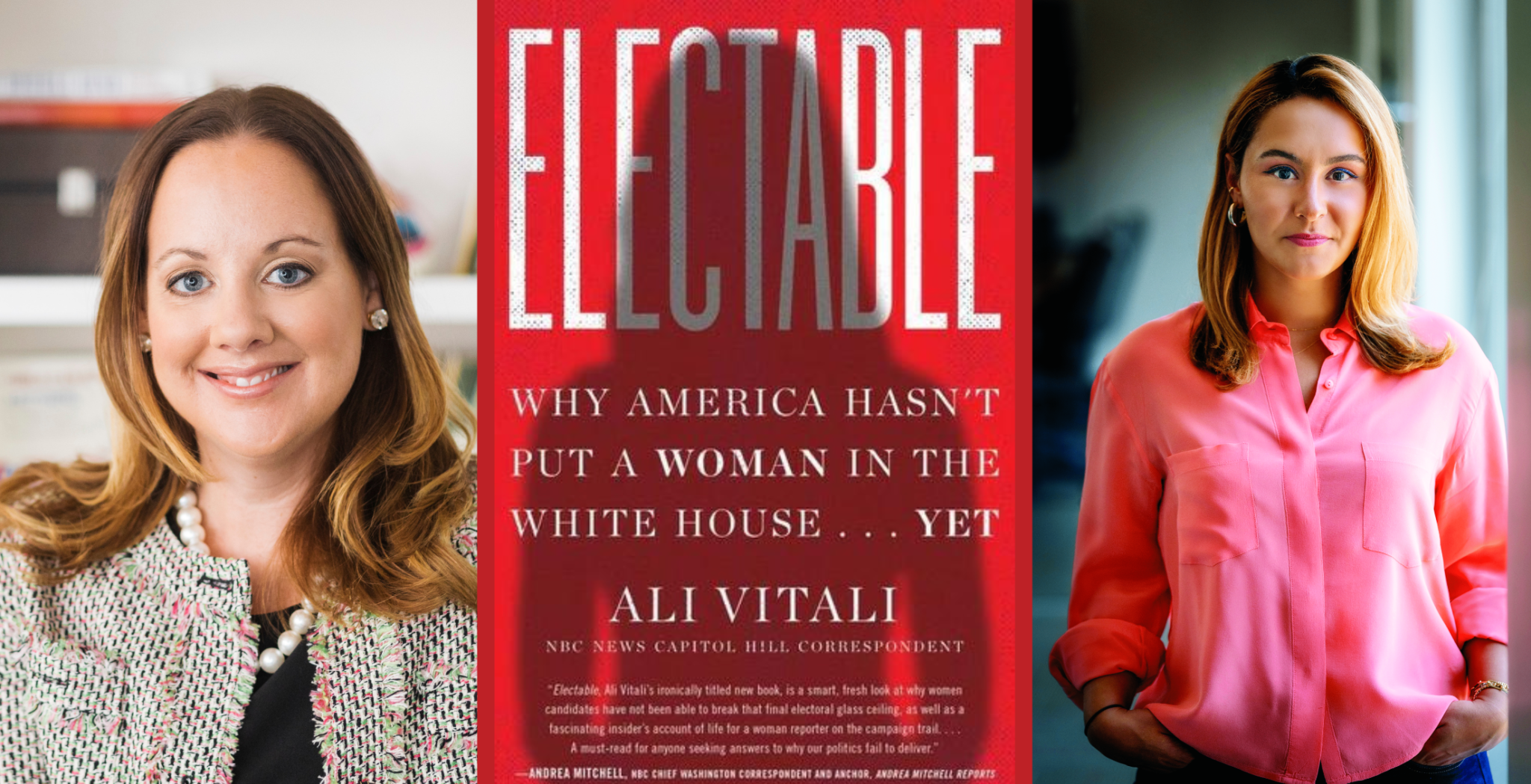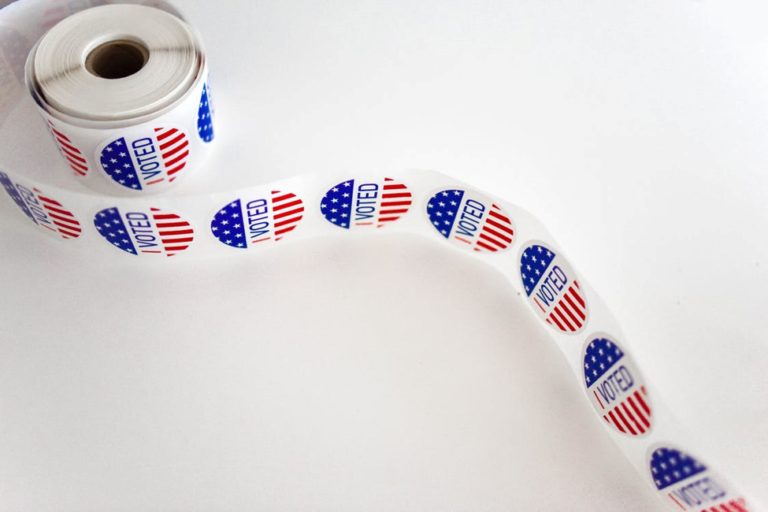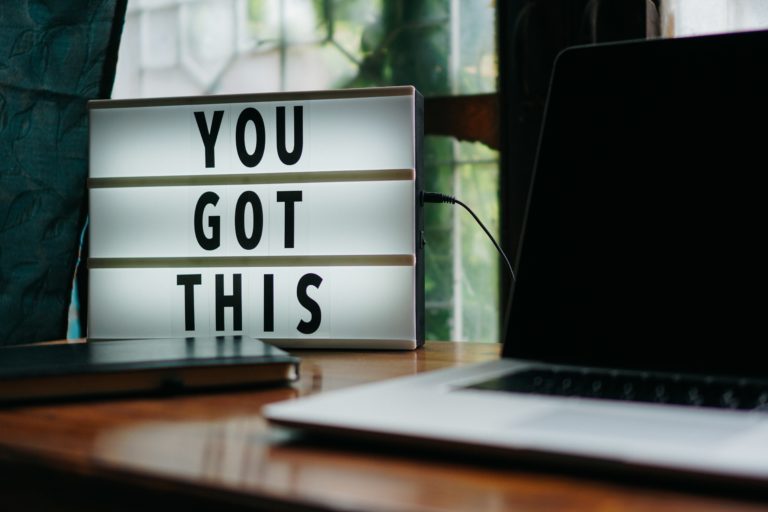Record numbers of women have entered politics since 2016, but there is still an…
A Conversation with Ali Vitali

NBC Capitol Hill Correspondent Ali Vitali’s new book, Electable, explores gender dynamics for women candidates in the 2020 Presidential Election, and asks what it will take to finally put a woman in the White House.
In this post, Vitali virtually sits down with the Barbara Lee Family Foundation’s Executive Director Amanda Hunter for a conversation about Vitali’s reporting for the book, her first-hand experience with women candidates on the campaign trail, and her outlook for the future of women in politics.
Amanda Hunter: First, thank you Ali for chatting with us here at Gender on the Ballot! We have talked about these issues a number of times in the past, and I love your new book so far. Congratulations! Let’s jump in: we’d love to hear what led you to write Electable.
Ali Vitali: This came directly from the work I was doing in 2020, reporting on the women who were running up until the moment they dropped their bids. My coverage of Senator Elizabeth Warren’s departure from the race — the idea of voters mourning the loss of a history making candidate once again by leaving two old white men as the last ones standing in the most diverse field of candidates ever — was the foundation of this book. But 2016 loomed over everything in 2020, so it made sense to try to look holistically at the last 5 years that I’d spent on the road covering politics, but to also reach back into history to chart the path of women running for this nation’s highest office…and why they’ve, so far, been falling short of the goal.
Amanda Hunter: You write in Electable about the many women voters you encountered on the 2020 campaign trail as you traveled with women Presidential candidates. What do you think it means for women across the country to be able to choose from multiple women on the ballot? As you say, for them to be able to vote for someone “like them”?
Ali Vitali: It means a lot— even for voters who aren’t voting based solely on gender or race or identity. Having reflective governance means policy and laws that can better reflect and solve the problems of more Americans. It’s why women need to have seats at every powerful table where decisions are being made. After 2020, with the elevation of Vice President Kamala Harris, that was achieved. But I toy a lot in the book with the idea of being elevated versus being elected outright, because that’s where we are at this point in history.
Amanda Hunter: This line from Electable jumped out at me: “Breaking through glass ceilings means you get cut.” Can you tell us more about how you’ve seen that play out for women barrier-breakers?
Ali Vitali: There were multiple times — I saw this a lot during major debates during the Democratic primary — that the women were losing even when they were winning; when their most powerful moments or aggressive contrasts were unpacked as somehow too power-seeking or too aggressive. Many operatives and candidates I spoke to for the book saw those moments as continual reminders that the women running had to be strategic about when they contrasted; they had to make sure they kept their emotions in check— which male candidates did not have to worry about in the same way; and that they were operating in a landscape that doesn’t often love or reward women when they overtly seek power. Which, of course, how do you become the most powerful person in the world without overtly seeking it?
Amanda Hunter: In the book, you not only cover the Democratic women candidates from 2020, you also revisit Sarah Palin’s experience as a Vice Presidential nominee, and you interviewed and wrote about Carly Fiorina (among other Republican women). What contrasts or similarities did you see between the paths for Democratic and Republican women candidates?
Ali Vitali: Democrats — voters and candidates, alike — tend to consider and speak about gender and identity politics more overtly than Republicans do. Sometimes to their detriment. But Republicans, by and large, eschew direct conversations around identity politics, even though, as we all know, that doesn’t mean women on the conservative side aren’t still subjected to gender cross-winds. As 2016 GOP presidential contender Carly Fiorina told me for this book, “it’s different when you’re different.” But most Republicans quickly follow up those lamentations by saying it should be about merit— which, of course! But to be seen as viable, and weighed on your merits, is something women have to work harder for than their male counterparts. Men are given the benefit of the doubt more easily, while the women have to bring the receipts and show they’ve earned it.
Amanda Hunter: While following Senators Amy Klobuchar, Kirsten Gillibrand, and Elizabeth Warren on the Iowa campaign trail, you observed that they were expanding the “mold of what presidential candidates looked like in real-time, giving more mental touchstones for female presidential candidate models beyond just Hillary Clinton.” What do you think the impact of that could be for 2024 and beyond, for women candidates?
Ali Vitali: It helps to have a roadmap, right? For any endeavor, you’re about to undertake but especially for a presidential campaign. Amy Klobuchar once told me that when she was first running for Senate, she went scouring the internet for other female senators talking about agricultural issues. She found then-Senator Hillary Clinton speaking about the New York State apple— not because Klobuchar wanted to focus on that particular fruit, but because she wanted to hear how other women-electeds were talking in this niche policy space.
It’s a small example that speaks to the bigger idea that it’s easier to go down a road someone else has already walked down. The more women running on the road to the White House, the more firm that ground becomes to run on for those who come next. And every woman who runs — on both sides of the aisle — is aware that what they do adds bricks to the road of the women who will come after them. Leaving them, not just campaigning for their own ambitions and goals, but knowing — however fairly or unfairly — that they’re carrying the torch for other members of their gender, too. It’s a burden that men don’t have to carry and one that all the women are keenly aware they must.
Amanda Hunter: I love the section of your book where you identify that, “from 1992 to 2008, voters did not even get the chance to consider voting for a woman to be the presidential nominee of either major party. That meant years of dormant American imaginations that could have further normalized women in the presidential space.” At BLFF, we talk about a similar concept, the “imagination barrier.” What do you think the status is of the American imagination when it comes to women in politics today?
Ali Vitali: Better than it was— but far from perfect. Because when we close our eyes and picture a president, most of the country still imagines a man standing in a suit and tie behind a podium with the presidential seal. They imagine “Mr. President”; not Madam. That’s understandable given that’s all we’ve ever seen in this country, but it means that on top of the fundraising, the staffing, the coalition building, and policy presenting, women candidates still have to go the extra step of asking voters to imagine something they’ve never seen as presidential before. And so far, for myriad reasons both political and gendered that I lay out in my book, they’ve failed to successfully do that.
Amanda Hunter: Finally, you saw so much—good, bad, inspiring, sexist, and everything in between—in your reporting for Electable. Are you hopeful for a time when the country will elect a woman President—and why?
Ali Vitali: Yes. I’m determined to be hopeful. I think the good news is that we’re now at a point where both parties have more women than ever in their pipelines who could mount viable, credible, electable presidential campaigns. They have the resumes, the legislative wins, the track record of service…the pipeline has finally caught up to a point where gone are the days of only men in the field and on the ballot. And I think gone are the days of only male tickets.
Now, the 2024 political landscape is tough because Biden and Trump still sit atop both parties and incumbents tend to have clearer paths to the nominations and fewer challengers. But so much can happen between now and when candidates start throwing their hats in the ring.
Still, as Secretary Clinton says to me at the end of the book: “I hope to see [a woman president] in my lifetime.” I tell her, I’d really love to stop saying that.
Join the Women & Politics Institute’s Women on Wednesdays conversation with Ali Vitali and Betsy Fischer Martin on Wednesday, 10/12 at 6 pm EST.
Photo credits by: HarperCollins Publishing and Andrew Harnick






